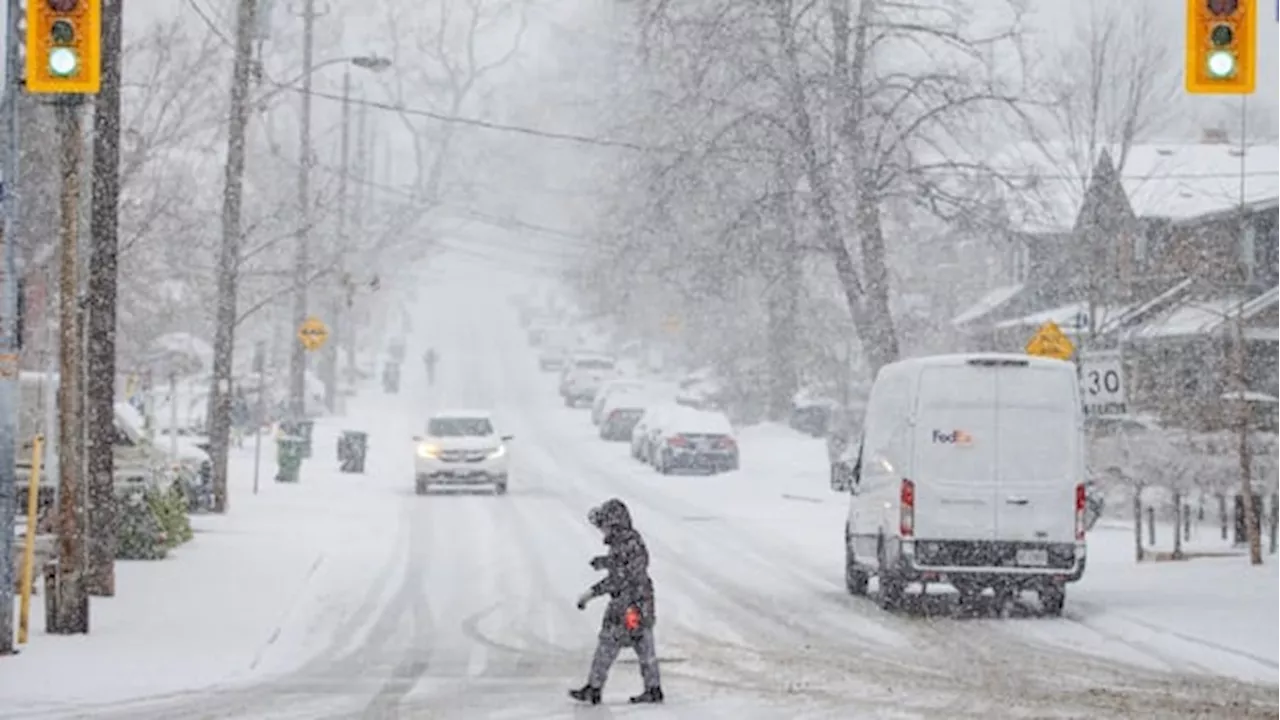A sudden rush of Arctic air is set to bring a dramatic drop in temperatures across Canada this weekend, with some areas experiencing a plunge of up to 30 degrees Celsius. Meteorologists warn of wind chills reaching as low as -45 degrees Celsius in some regions, making it the coldest weekend of the season so far.
Parts of Canada will be gripped by frigid temperatures this weekend as a surge of Arctic air sweeps across North America. Meteorologists predict a dramatic drop in temperatures, potentially as much as 30 degrees Celsius, leaving some areas experiencing a shocking transition from a pleasant 5 degrees Celsius to a bone-chilling -25 degrees Celsius. 'This will be the coldest weekend of the season for many places,' stated CBC climate specialist Darius Mahdavi.
Environment Canada warns of wind chills reaching -40 degrees Celsius in northern Alberta and plummeting to -45 degrees Celsius in parts of Saskatchewan, Manitoba, Ontario, and Quebec. The most severe conditions are expected in Nunavut, where wind chills could feel as low as -58 degrees Celsius. Significant snowfall is anticipated for Atlantic Canada, while coastal British Columbia will face unseasonably cold weather.While the weather event is being referred to as a 'polar vortex', Mahdavi clarifies that this term describes a large-scale atmospheric cyclone located above the North and South Pole. The current cold spell is attributed to a disruption in this vortex, with the ring of icy air stretching southward across North America. 'What we're seeing is the oscillation of the polar vortex, wobbling southeastward, allowing cold air to spill down,' explained Brian Proctor, an Environment Canada meteorologist based in Edmonton. This southward stretch of the polar vortex is becoming more frequent, and experts like Judah Cohen of Atmospheric Environmental Research link these occurrences to human-caused climate change and the shrinking temperature difference between the Arctic and the rest of the world. These events can also trigger changes in the jet stream, causing cold air and weather systems to plunge southward.The extreme cold poses a risk to everyone, but young children, seniors, individuals with chronic illnesses, outdoor workers, and the homeless are particularly vulnerable. Families are urged to keep their pets indoors.
Arctic Air Canada Cold Weather Polar Vortex Extreme Temperatures Wind Chills Snowfall
Canada Latest News, Canada Headlines
Similar News:You can also read news stories similar to this one that we have collected from other news sources.
 Celsius Turns 50 in CanadaEnvironment Canada's adoption of Celsius turns 50 in 2025, marking a significant milestone in Canada's long journey towards metric conversion.
Celsius Turns 50 in CanadaEnvironment Canada's adoption of Celsius turns 50 in 2025, marking a significant milestone in Canada's long journey towards metric conversion.
Read more »
 Canada Celebrates 50 Years of Celsius in Weather ForecastingCanada marks the 50th anniversary of using Celsius for weather temperature measurements in 2025. The switch, initially met with resistance, ultimately led to a widespread adoption of the metric system in the country.
Canada Celebrates 50 Years of Celsius in Weather ForecastingCanada marks the 50th anniversary of using Celsius for weather temperature measurements in 2025. The switch, initially met with resistance, ultimately led to a widespread adoption of the metric system in the country.
Read more »
 Canada's Celsius Switch Turns 50Environment Canada's adoption of Celsius for weather temperature in 1975 marked a significant milestone in Canada's national metric conversion. While the switch initially faced resistance, it eventually became the norm, with Canadians now using Celsius for everyday measurements.
Canada's Celsius Switch Turns 50Environment Canada's adoption of Celsius for weather temperature in 1975 marked a significant milestone in Canada's national metric conversion. While the switch initially faced resistance, it eventually became the norm, with Canadians now using Celsius for everyday measurements.
Read more »
 Canada's Metric Shift: From Fahrenheit to Celsius Weather ForecastsThis article explores Canada's transition to the metric system, focusing on the shift from Fahrenheit to Celsius for weather temperature measurements. It details the initial public resistance, the gradual adoption process, and the eventual success of the change.
Canada's Metric Shift: From Fahrenheit to Celsius Weather ForecastsThis article explores Canada's transition to the metric system, focusing on the shift from Fahrenheit to Celsius for weather temperature measurements. It details the initial public resistance, the gradual adoption process, and the eventual success of the change.
Read more »
 Canada's Celsius Shift Turns 50Environment Canada's adoption of Celsius for weather temperature in 1975 marked a significant milestone in Canada's metric conversion journey. While initially met with resistance, the switch ultimately led to widespread use of the metric system in everyday life.
Canada's Celsius Shift Turns 50Environment Canada's adoption of Celsius for weather temperature in 1975 marked a significant milestone in Canada's metric conversion journey. While initially met with resistance, the switch ultimately led to widespread use of the metric system in everyday life.
Read more »
 Canada's Metric Conversion: Celsius Takes Over Weather ForecastingThis article recounts Canada's transition to the metric system, focusing on the milestone of using Celsius for weather temperature starting on April Fool's Day in 1975. It details the initial public resistance, the gradual acceptance, and the lasting impact of this conversion.
Canada's Metric Conversion: Celsius Takes Over Weather ForecastingThis article recounts Canada's transition to the metric system, focusing on the milestone of using Celsius for weather temperature starting on April Fool's Day in 1975. It details the initial public resistance, the gradual acceptance, and the lasting impact of this conversion.
Read more »
